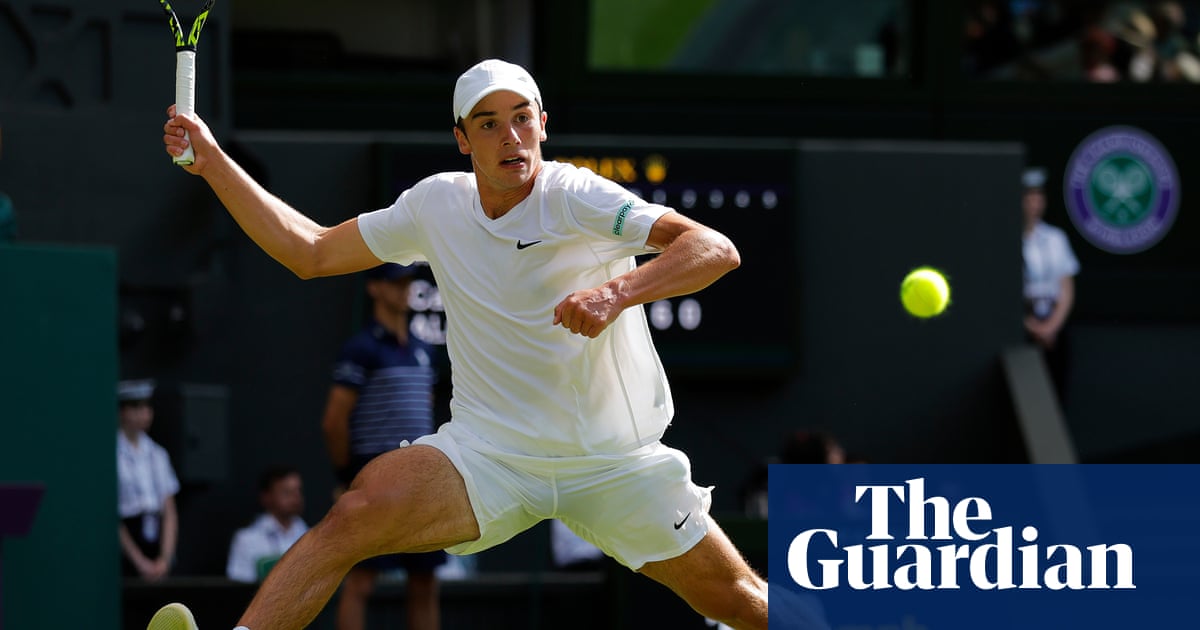As a script it surely would have been rejected by Hollywood for being too outlandish. A 21-year-old British student, who has never played on the main tennis tour before, suddenly finds himself on Centre Court with 15,000 people cheering him on. And on the other side of the net is theWimbledonchampion.
Yet that was the situation that Oliver Tarvet, the world No 733 from St Albans, found himself in on Wednesday as he lined up to face the brilliant SpaniardCarlos Alcaraz.
And while there was no fairytale ending, withTarvet losing 6-1, 6-4, 6-4he left to a standing ovation and warm words from his illustrious opponent, who predicted that he could go on to achieve great things.
“Big praise to Oliver,” said Alcaraz. “Only his second match on the tour and I just love his game. Some great tennis. I had to be really focused and play my best tennis. If he keeps practising hard and playing at a professional level, I think he can go far.”
It has been some journey. A week ago, nobody in tennis circles had heard of Tarvet, who studies communications and marketing at the University of San Diego.
After making the 5,482-mile trip to London to play in the Wimbledon qualifying tournament, he then had to win three matches to even make it to the main event. But having arrived at Centre Court, Tarvet looked right at home as he played his brand of attacking tennis from the off.
In one respect, Tarvet could not lose, because nobody expected him to beat Alcaraz. Yet, somehow, he also won by showing he belonged.
“There were a lot of nerves,” he said afterwards. “I woke up a couple times in the night from the adrenaline and in the car my heart rate was going quicker than it usually does. But a big emphasis was to enjoy, enjoy the moment and enjoy the opportunity, because it doesn’t come around too often. And I think I did a pretty good job of that.
“It’s not the result that I wanted, but it was definitely the most special day.”
It would have been easy for Tarvet to be overawed. He was the lowest-ranked player in the entire draw and until last week, he had never played an opponent ranked higher than 367.
Now he was facing afive-time grand slam winner, on the most famous court in the world. Many would have shrunk under the intensity of the experience and the power of Alcaraz’s groundstrokes. Yet Tarvet battled to the end.
The first set was surely the least one-sided 6-1 scoreline of the tournament. Tarvet had breakpoints in three of Alcaraz’s service games, only for the Spaniard to find incredible winner after winner.
Yet Tarvet refused to allow his spirit, or his level, to drop. There was an explosion of joy and hope when he broke to lead 2-0 at the start of the second set, and while he could not see it out, Alcaraz increasingly knew he was in a real match. It was a similar story in the third set, but Alcaraz just had a little more power and nous.
“I definitely had chances that should give me confidence that I was competing,” said Tarvet. “I just need to credit him. He plays the big points just incredibly well. And that’s the difference. I felt I was in the first set and yet I lost it 6-1. And it’s an intimidating place to be when you are hitting a second serve with Carlos Alcaraz standing there.”
Tarvet is the latest of a growing number of British players who are using the US college system as a finishing school before turning professional. Both Cameron Norrie and Jacob Fearnley, who are both ranked inside the world’s top 70, have shown how it can work.
However, it also means that while the other players who made the second round here will earn at least £99,000, under US college rules he can only claim $10,000 (£7,290) in profit every year, as well as any expenses incurred during the events.
Not that Tarvet minds, given the memories he has made. “My goal for going into the first round of qualifying was just to play my brand of tennis,” he said. “Obviously it was a great opportunity for me. And I have proved that was worth that wildcard and that chance.”
On the third day of action there were three more British victories with Sonay Kartal getting things under way by beating Viktoriya Tomova. Norrie followed suit with a surprise four-set victory over the 12th seed Frances Tiafoe. Late into the night Emma Raducanu also booked her place in the last 32 with a win over 2023 Wimbledon champion Marketa Vondrousova.
Meanwhile, whatever happens next in Tarvet’s burgeoning career, he will always be able to tell the story of a remarkable day. And as a communications and marketing student, he was also able to deliver a message with punch and panache: British tennis has another exciting young talent on its hands.
